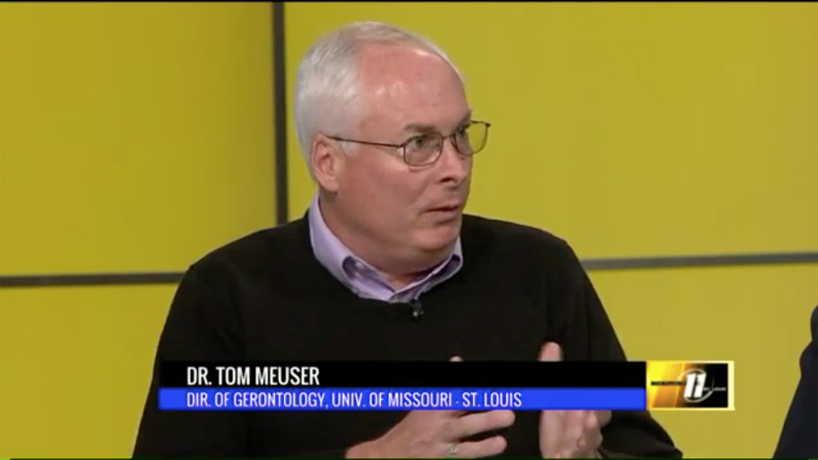
Tom Meuser, the director of the gerontology program at UMSL, appeared on “The Pulse of St. Louis” and shared insight on the impact Alzheimer’s Disease can have on caregivers.
An estimated 110,000 Missourians suffer from Alzheimer’s, but they are not the only victims of a disease often referred to as the long goodbye.
Each patient averages about three caregivers, and a study conducted by the Alzheimer’s Association showed that 35 percent of them say their own health has gotten worse because of responsibilities related to taking care of their loved one.
The results of the study were released as part of the 2017 Alzheimer’s Disease Facts and Figures report.
Tom Meuser, director of the gerontology program at the University of Missouri–St. Louis, joined a panel of experts and host Shirley Washington to discuss the impact the disease has on caregivers Saturday night on “The Pulse of St. Louis” on KPLR (Channel 11).
Alzheimer’s presents challenges for caregivers most other diseases or ailments do not.
“Let’s say you have a tumor or something that’s benign, that has to be removed – maybe there’s this period of recovery that happens that you know you’re going to be well in the end,” Meuser said. “The experience of the caregiver is from that point of diagnosis through to helping that person recuperate over a period of weeks or months and they get better.”
Alzheimer’s doesn’t follow the same trajectory, as explained by the panel. The discussion included neurologist Joy Snider from Barnes-Jewish Hospital and Washington University in St. Louis; Stephanie Rohlfs-Young, the vice president of programs for the St. Louis Chapter of the Alzheimer’s Association; and Patricia Brown, who brought the perspective of a caregiver, having looked after her mother, who suffered from the disease before she died.
“The disease continually progresses, so early on, a person might need only help managing their medications so they know when to take it, maybe knowing when appointments are – just kind of memory jogs,” Meuser said. “Over time, though, it becomes all-consuming, and a lot of Alzheimer caregivers are not prepared for that transition for it to become all-consuming. They get into this groove, and it’s easy to put blinders on and just deal with what’s in front of you.”
It can exact an emotional and physical toll as the responsibilities associated with being a caregiver become more demanding.
“One of the big risks for caregivers is getting depressed and burned out, in part because there can be this go-it-alone mentality,” Meuser said. “‘Well, I’m the adult daughter’ – who often gets to be the one who’s the caregiver – or ‘I’m the spouse, I have to do it all myself.’ Part of the care side of this with the Alzheimer’s Association is helping people recognize: You have choices. You have alternatives. You can get help. You don’t have to shoulder this burden alone.”
The caregivers of Alzheimer’s patients simultaneously have to cope with day-to-day responsibilities while also confronting the loss of their loved one.
Meuser said that the sense of depression that can hit them might be better labeled grief.
“It would be a form of grief we would label anticipatory grief,” he said. “We know that we’re losing a person gradually. Alzheimer’s has been labeled the long goodbye, and there’s a reason. Many people don’t realize it’s a long-term, terminal illness. Alzheimer’s at its end point leads to death. Most people with the disease will die from something else. But for the family, you’re losing little bits of that person every day, every week.”
Meuser offered encouragement aimed at caregivers near the end of the discussion.
“I think it’s easy to get hard on yourself when you’re a caregiver, particularly if you think you’re not doing it right,” he said. “I’m here to say there are no right and wrong answers. There is the best option that you can manage in that moment, and that’s what you go with. Yes, maybe it’s not all perfect, but in the grand scheme of things, it’s your overall commitment that counts.”
Watch a portion of the discussion from the hour-long program here.














